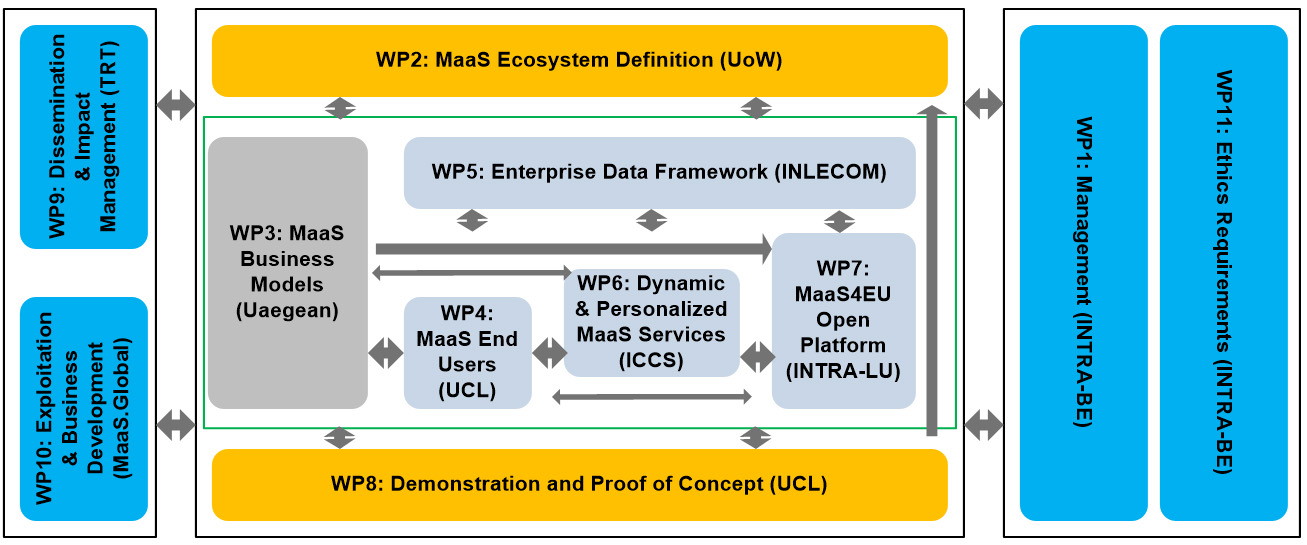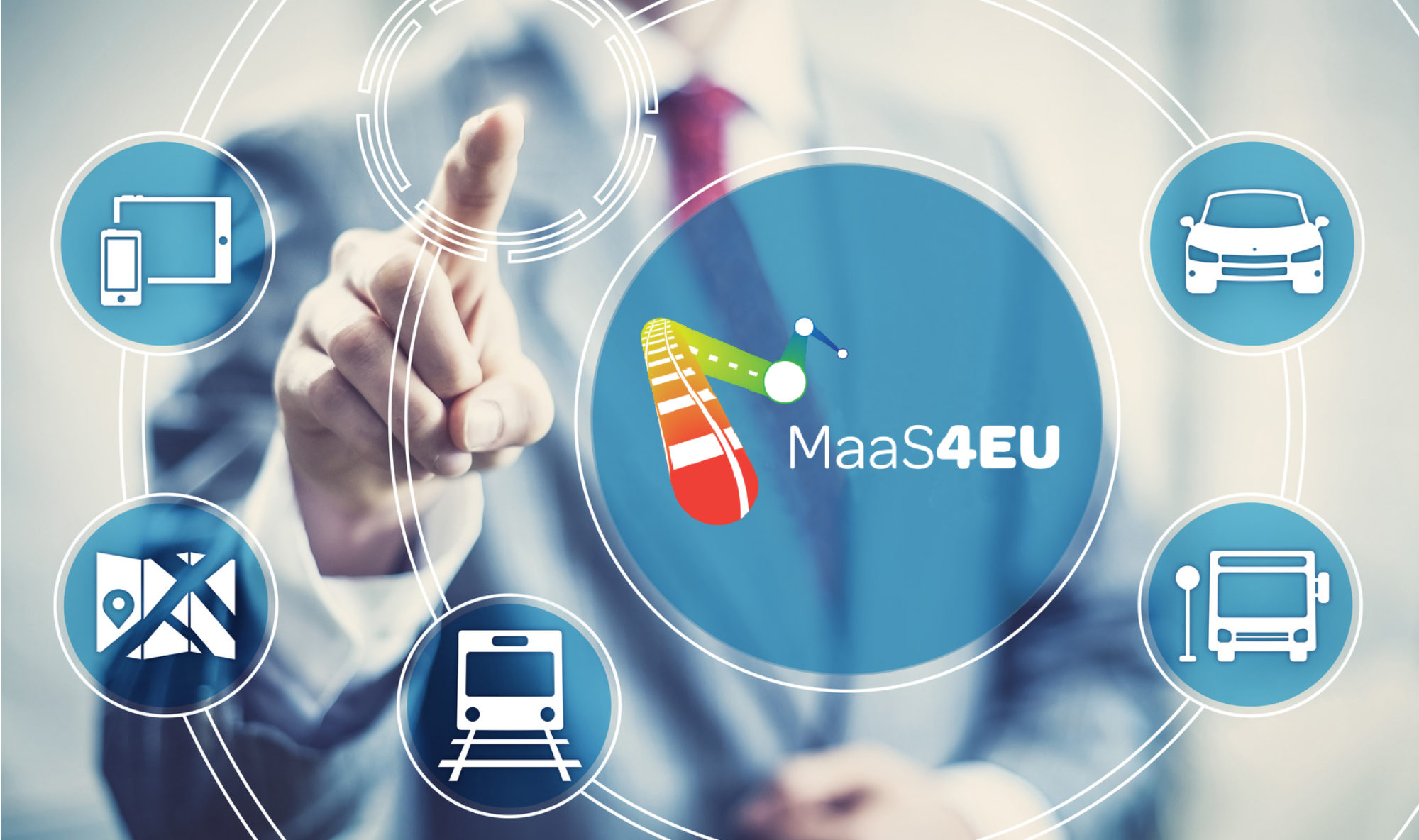PROJECT OVERVIEW
With the projected growth in transport demand, the current modus operandi in transport supply is deemed unsustainable and generates the need for innovative services that could support seamless mobility and a shift from car ownership to user ship. An emerging trend towards this direction is the integration of on-demand modes in conjunction with public transport, leading to the Mobility-as-a-Service (MaaS) concept.
MaaS is a user-centric, intelligent mobility distribution model, in which users’ needs are met via a single platform and are offered by a service provider, the mobility operator.
Although activities in this field are ongoing, at present there are no established frameworks and quantifiable evidence about MaaS costs and benefits, users’ needs, as well as its influence on travel patterns and car ownership of various user groups.
Against this background MaaS4EU will provide quantifiable evidence, frameworks and tools, to remove the barriers and enable a cooperative and interconnected EU single transport market for the MaaS concept. This will be achieved by defining sustainable business models that support the cooperation across transport stakeholders, understanding user needs and choices, implementing the required technological infrastructure (a MaaS mobility hub) and identifying the enabling policy and regulatory frameworks. The project will provide quantifiable evidence about MaaS costs and benefits in 3 real-life, complementary pilot cases, demonstrating the concept in urban, intercity and cross-border trips at 3 EU areas (UK, LUX-DE, HU)

WP1: MANAGEMENT
WP1 ensures the smooth operation of the project in terms of strategic and day-to-day management and interfacing with the European Commission (EC).
More specifically, WP1 objectives are to:
- establish a strong project management scheme and processes;
- ensure strategic management of the project, establish a common understanding of goals and maximize impact;
- ensure day-to-day coordination and successful achievement of project objectives on time and within budget;
- establish appropriate communication within the consortium and support effective liaison with the EC;
- ensure efficient scientific and technical coordination;
- implement and maintain procedures for quality and risk management in order to ensure the quality of the final results and deliverables and to promptly identify, assess and efficiently manage any related risks.
WP2: MaaS ECOSYSTEM DEFINITION
WP2 provides the conceptual backbone of the overall MaaS4EU solution, enables common understanding among project partners and MaaS stakeholders, supports the MaaS ecosystem requirements acquisition and specification process, while integrating the business, end-users, technological and policy aspects of the project. In more details, WP2 will:
- provide an update on the relevant state of the art;
- work with the stakeholders involved in the MaaS ecosystem to identify and analyse their requirements, concerns, barriers and opportunities regarding this concept;
- prepare the use case scenarios that will guide the development of the MaaS4EU technological solution;
- define a reference architecture that will integrate various transportation models and IT solutions and will provide the basis for future deployments of the MaaS4EU platform;
- develop the enabling MaaS Policy Framework.
WP3: MaaS BUSINESS MODELS
WP3 focuses on the MaaS business models, the design and pricing of the MaaS services, the financing and revenue allocation models, the legal requirements and the passenger rights (MaaS users rights).
In more detail, WP3 objectives are to:
- design, price and position MaaS services and define the value chain;
- design the MaaS business ecosystem and organisational structures in regards to whom is the MaaS operator, as well as the cooperation agreements needed with the MaaS ecosystem actors;
- investigate the financing schemes for the MaaS concept and design revenue allocation models between the MaaS operators and their “suppliers”;
- study the current legal and regulatory barriers that hinder the MaaS market; and
- recommend improvements for the EU Passenger Rights to protect the MaaS users and suppliers
WP4: MaaS END USERS
WP4 explores the needs, preferences, and demand for MaaS services of various end users groups, assesses MaaS acceptance rate, and identifies changes in travel decisions given the MaaS concept. In more detail this WP will:
- design the market research survey tools;
- analyse survey data and classify users based on personality traits, attitudinal and socioeconomic characteristics;
- develop the users’ information model;
- estimate advanced demand behavioural models for MaaS acceptance and willingness to pay;
- develop dynamic models to capture users changes for short- / med- term travel decisions given the MaaS services
WP5: ENTERPRISE DATA FRAMEWORK
The aim of WP5 is to develop the enterprise data framework that will underpin the operation of the MaaS4EU technology platform. In more detail, this WP will:
- develop the data infrastructure (models and physical) that will underpin the operation of the MaaS4EU platform;
- develop the adaptors and APIs for the integration of heterogeneous data sources and services as part of the technology platform;
- develop models and algorithms that will support data analytics;
- develop services focussed on the portability, management and security of data with special attention to user privacy.
WP6: DYNAMIC & PERSONALIZED MaaS SERVICES
The aim of WP6 is to develop a suite of models and algorithms that will underpin the dynamicity and personalization of the MaaS services. In addition, this work-package will implement the developed models as software components that will be integrated into the MaaS4EU platform. The proposed developments will assist users to plan daily trips based on their MaaS packages and individual preferences, aim to sustain an equilibrium between supply and demand in order to minimize unavailability of certain services, guide users for the selection of initial MaaS packages and add-on services dynamically, as well as provide personalized information and recommendations to the users while interacting with the MaaS ecosystem. The aforementioned developments will be delivered in two iterations, in line with the overall methodology adopted by the project. The first iteration will contain core features as identified in the reference architecture after considering user requirement, which, after their integration in the MaaS4EU open platform, will be evaluated in the MVP demonstration. The second iteration will allow the continuous development of the MaaS4EU solution by providing additional features and functionalities on the basis of insights gathered during the first evaluation, that will not only address potential issues but will also exceed user expectations by incorporating advanced research results and allowing interactions among the individual models and services. The second iteration will deliver features for the Final MaaS4EU product.
WP7: MaaS4EU OPEN PLATFORM
WP7 is responsible for the integration of the findings in WPs 4-6 towards a single MaaS4EU open platform, as well as for the development of the Personal Mobility Assistant, a mobile and a web application that will facilitate the interaction of the users with the MaaS4EU services.
The integration will be guided from the MaaS Reference Architecture, which will be evolved into a detailed architecture and design specifications. In addition to the data framework (WP5) and the components that will realise the dynamic and personalised services (WP6), services related to booking, ticketing and payments will also be integrated for the provision of a holistic MaaS ecosystem. To ensure the ‘openness’ of the MasS4EU solution, this work-package will provide the necessary APIs for the integration of new services external to MaaS4EU, as well as, APIs for exporting data generated within the platform. Moreover, this work-package will undertake the testing of the integrated platform prior its deployment for demonstration. In parallel, WP7 will assure quality during the whole software development and integration process and testing of the platform.
WP8: DEMONSTRATION AND PROOF OF CONCEPT
The solutions developed in all the previous work packages will be tested and demonstrated within WP8. The objectives of this WP are to:
- set up the pilot areas for the demonstration;
- design the MaaS Living Labs for each pilot area that will be used to recruit participants for the development and testing of the MaaS4EU solution;
- demonstrate the MaaS4EU solution and collect data about end-users MaaS demand and travel behaviour and feedback for validating the technological solutions;
- evaluate the pilots and the impact of MaaS.
WP9: DISSEMINATION AND IMPACT MANAGEMENT
The main objective of this work package is to promote the MaaS4EU solution so it becomes synonymous with clever, smart, green and integrated mobility services. In order to scale-up and disseminate the tools the consortium will:
- define dissemination objectives associated with quantifiable indicators;
- identify the different target groups, key messages, communication channels and activities, schedule rollout and implement a communications program in alignment with exploitation actions in order to maximise impact;
- blend different channels and tools to reach the widest possible audience, including business stakeholders and the public, through the effective flow of information and publicity about the project’s open architecture and tools;
- innovative channels will be used for awareness raising and knowledge transfer, such as the EU MaaS hackathon.
- The challenge will generate enthusiasm and take up of the MaaS4EU services and trigger a range of high quality demonstrations across Europe;
- facilitate the creation of a community of users of the MaaS4EU framework and services;
- collaborate with External Experts and other ITS projects;
- monitor and evaluate results against the target values (indicators) and make necessary amendments.
WP10: EXPLOITATION AND BUSINESS DEVELOPMENT
This work-package contributes to scale-up and disseminate the tools through the following tasks:
- To monitor the MaaS market and identify other MaaS initiatives.
- To handle the intellectual property rights of the partners and the IPRs that will emerge via the MaaS4EU project.
- To design the commercialization strategy and the business plan for the outcomes of the MaaS4EU project to ensure sustainable business development of the proposed solution.
WP11: ETHICS REQUIREMENTS
This work package sets out the ‘ethics requirements’ that the project must comply with.


